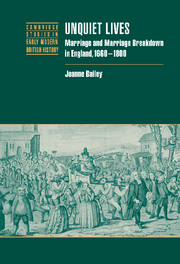Book contents
- Frontmatter
- Contents
- Acknowledgements
- List of abbreviations and conventions
- 1 Introduction: reassessing marriage
- 2 ‘To have and to hold’: analysing married life
- 3 ‘For better, for worse’: resolving marital difficulties
- 4 ‘An honourable estate’: marital roles in the household
- 5 ‘With all my worldly goods I thee endow’: spouses' contributions and possessions within marriage
- 6 ‘Wilt thou obey him, and serve him’: the marital power balance
- 7 ‘Forsaking all other’: marital chastity
- 8 ‘Till death us do part’: life after a failed marriage
- 9 ‘Mutual society, help and comfort’: conclusion
- Appendices
- Bibliography
- Index
- Titles in the series
4 - ‘An honourable estate’: marital roles in the household
Published online by Cambridge University Press: 27 July 2009
- Frontmatter
- Contents
- Acknowledgements
- List of abbreviations and conventions
- 1 Introduction: reassessing marriage
- 2 ‘To have and to hold’: analysing married life
- 3 ‘For better, for worse’: resolving marital difficulties
- 4 ‘An honourable estate’: marital roles in the household
- 5 ‘With all my worldly goods I thee endow’: spouses' contributions and possessions within marriage
- 6 ‘Wilt thou obey him, and serve him’: the marital power balance
- 7 ‘Forsaking all other’: marital chastity
- 8 ‘Till death us do part’: life after a failed marriage
- 9 ‘Mutual society, help and comfort’: conclusion
- Appendices
- Bibliography
- Index
- Titles in the series
Summary
The extensive secondary complaints made by spouses with marital difficulties offer a holistic view of rural and urban seventeenth- and eighteenth-century married life, in the context of the household and its economy. ‘Household’ is used in the broadest sense as the place of residence of a married couple, sometimes with children and/or servants. It is not, however, intended to suggest that a household can only be considered as such when it was based upon a nuclear family, with a property-owning husband as an authoritative figure to whom other household members were subordinate. Contemporary perceptions of family were much wider and the existence of households was not dependent upon the conjugal unit, since lone men and women frequently headed them. Moreover, the matrimonial cases demonstrate that authority did not always reside only in the male and that households were not tied to specific types of property or social ranks. For example, married couples from the poor to the gentry lodged in lodging houses, and they too formed households. The chronology of marriage and life-course often influenced both the type of residence, with some couples living in lodgings or with parents in the early years, and the number of residents within the household. Children came and went according to age and situation, second marriages introduced step-children, and siblings, cousins and parents temporarily resided, as did lodgers, servants and apprentices.
- Type
- Chapter
- Information
- Unquiet LivesMarriage and Marriage Breakdown in England, 1660–1800, pp. 61 - 84Publisher: Cambridge University PressPrint publication year: 2003



